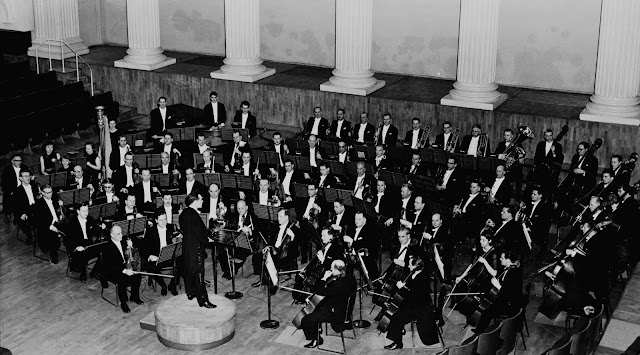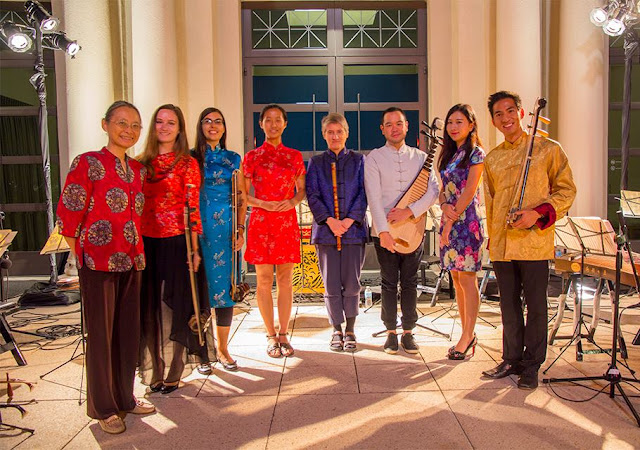 |
| Soloist tenor Zwakele Tshabalala during a performance from the World Economic Forum Annual Meeting. Photo by WEF. |
I have been a beneficiary of affirmative action. I think. Probably? Why else would I have been born a gay person of color if not to give meaning to the paradoxical struggle that is diversity? (Though I am grateful that phở and bánh xèo were the culinary staples in my household growing up. Gay sex is pretty great, too).
My brother, Tuan, and I were born and raised in Los Angeles to two Vietnamese refugees, Buong and Bau, who came to the U.S. thanks to the United Nations’ Orderly Departure Program of 1979 following the Vietnam War. It was created out of a need to address the dangerous choices people were making to flee their war-torn, communist-ruled countries by precarious boats. Resettlement efforts were made possible after the passage of the Indochina Migration and Refugee Assistance Act of 1975 and the Refugee Act of 1980.
 |
| Vietnamese refugees emigrating from Vietnam, 1975. Photo by manhhai. |
Tippi Hedren, a Hollywood actress best known for her lead role in Alfred Hitchcock’s The Birds, no less became known as the godmother of the nail industry after she introduced a group of Vietnamese refugee women to her personal manicurist, Dusty Coots, who taught them how to do nails as they would be done in Beverly Hills. Today, half of all nail technicians (80% in California) are of Vietnamese descent—including my mother.
My parents, it would appear, were also beneficiaries of affirmative action.
 |
| Tu’s parents, (left to right) Buong and Bau, in Vietnam, 2006 |
Before arriving as a freshman at UCLA in 2006, I remember feeling warm fuzzies about the school’s admissions process with words like “holistic,” “comprehensive,” and “diversity.” When I learned that the student body was 0.4% Native American, 13% Latino, and 3% Black,[1] I just assumed that there were more Asians and whites who made the cut, all things being equal.
Except, of course, all things are not equal, and therefore affirmative action is necessary to account for the unequal access to opportunities and resources that black, latino, and indigenous students have been systematically denied. But it took me some time to accept this reality.
I struggled to reconcile the seeming contradiction that racial discrimination was the appropriate remedy for racial discrimination. I also sympathized more easily with the view that inequities resulting in the racial disparities of college campuses should be addressed much earlier than AP Calculus and SATs. Race-conscious policies seemed to me like a band-aid that diverted attention away from the root causes, ultimately trapping us in a vicious cycle forever replacing bloody bandages with new ones to treat an immortal disease.
When an anti-affirmative action group, Students for Fair Admissions, sued Harvard claiming its admissions policies imposed a racial quota keeping the number of admitted Asians low to maintain balance, it struck a nerve. According to an analysis[2] of over 160,000 individual admissions files between 2000-2015, Asians scored higher than all other racial and ethnic groups on test scores, grades, and extracurricular activities, but received the lowest scores on personality measurements like likability, integrity, courage, and kindness. My reaction could very much be encapsulated in a fond acronym: WTF.
I understood the value of diversity, but didn’t believe that the cost should come at the expense of those that looked like me, and certainly not when that cost is exacted based on stereotypes. This led me to wonder about the basis on which I was admitted to UCLA. Did I get in because I bucked those stereotypes? Because I wrote about coming out in my personal essay? Or was I just filling a racial quota? The thought that my admission might have overlooked my academic achievements in favor of my melanin was jarring and threatened to shatter my identity and self-worth. I went so far as to file a FERPA (Family Educational Rights and Privacy Act) request to see my admissions file, hoping to find validation that I was accepted on my merits, but because it was so long ago, all evaluative comments had been purged from the record.
I realized that at the heart of my turmoil was the notion that merit, not racial quotas, ought to determine the best. The best students, the best job candidates, the best musicians. Anthony Tommasini issued a clarion call[3] in the New York Times to end blind auditions in order to increase diversity in orchestras. His proposal, borne out of this year’s reckoning with police brutality, particularly against black and brown people, and the state of racism in the United States and abroad, is one of many expressions of solidarity. But, I could not look past what seemed yet again another example of one minority group being harmed in favor of another.
 |
| A classical music orchestra with homogenous white members from the Helsinki Philharmonic, 1965. Photo by Volker von Bonin. |
When blind auditions began being implemented from the 1970s onward, women in the top five U.S. orchestras increased from 5% to 25% in 1997. Today, women make up 40% of orchestras[4] in the nation. Do we disrupt that progress to make way for more people of color? How do we take one step forward without taking two steps back? Several suggestions were put forth[5] to approach this conundrum after understandable outcry after Tommasini put a target on the back of blind auditions (and himself). The only consensus to be found is that of doing something. Anything. But race must be taken into account directly. And in this case, so does gender.
 |
| UCLA World Music Summer Institute students after a performance capping the end of the program, 2010. |
I was a counselor for two summers in charge of a group of high school kids who were part of UCLA’s World Music Summer Institute, a one-week program created to give young diverse people an opportunity to learn about and participate in different musical cultures and traditions, made possible by the school’s storied and renowned Ethnomusicology department. I could see how magical it was for these kids (as it was for me when I decided to switch my major from math to music) to experience something new and meaningful that they might not have ever considered before. Black girls plucking the strings of a kayagum, white boys sitting in a Crenshaw church service listening to a gospel choir, and young Asian violinists marveling at the violinists of a mariachi band. Young people of different races, ethnicities, and genders thrust into unabashedly cultural spaces, intimately learning and collaborating with one another. This was as direct of an application of affirmative action in music as I’ve ever seen.
Affirmative action, though, is a zero-sum game, and not at the same time. Herein lies the paradox, one in which I and so many others of intersectional disposition find ourselves: I’m a cisgender gay man of Vietnamese descent who is overrepresented and underrepresented in higher education, music, and tech (in which I work). This entanglement pitted merit and diversity against one another, clouding my path to realizing that the fact that I’m even able to entertain such contradictions reveals a privilege of dissent.
Black people don’t get to dissent. They get reported to the police for birding. They get followed around in convenience stores. They get shot while jogging. While sleeping. While being. Again. And again. And again.
We are not all in this together. Not yet. None of my achievements have ever been a product of solitary prowess. I benefited from access to food, shelter, family, friends, community, public assistance and education, but most of all—the privilege of being non-black. This is the reality hidden just beyond the thick veil of meritocracy that permeates this country.
When I think about why we still hold Pride celebrations and fight for equal rights, the answer is clear: LGBTQ+ people have and continue to endure discrimination, violence, and death simply for being. Why do we have affirmative action? Because of slavery, Jim Crow, and all of the above. It’s not so much about achieving diversity as it is an attempt to right injustices against black people, when for hundreds of years the United States had a racial quota of 100% white.
Many of us have finally woken up this year to the cruel realities that black and brown people experience everyday, heeding the call to action to not just be non-racist, but anti-racist. Similarly, for affirmative action to realize its intent, individuals and institutions need to not just be declaratory, but prescriptive. Improve access to resources and opportunities from kindergarten all the way to college. Expand efforts to recruit in communities of color. Redefine what it means to be a world-class musician, blind audition or no. And if all these efforts result in some of us not getting into Harvard, Google, or the Cleveland Orchestra, then that’s a small sacrifice to make for the greater purpose of reparations, and a necessary stop on the way to justice.
So yes, I was a beneficiary of affirmative action. I am. And it’s time we all do our part to support our black siblings on our backs and hands until the day we can all reach for an apple from anywhere under the tree.
References
1. "Fall enrollment at a glance". University of California. 2020-01-21.2. "SFFA Files Motion for Summary Judgement Against Harvard". Students for Fair Admissions.
3. Tommasini, Anthony (2020-07-16). "To Make Orchestras More Diverse, End Blind Auditions". The New York Times. ISSN 0362-4331.
4. Sergeant, Desmond Charles; Himonides, Evangelos (2019). "Orchestrated Sex: The Representation of Male and Female Musicians in World-Class Symphony Orchestras". Frontiers in Psychology. 10. doi:10.3389/fpsyg.2019.01760. ISSN 1664-1078.
5. Woolfe, Zachary; Barone, Joshua (2020-09-10). "Musicians on How to Bring Racial Equity to Auditions". The New York Times. ISSN 0362-4331. Retrieved 2020-09-26.
----------
Tu Nguyen is a Los Angeles-based composer and performer. He began studying classical sax at 14. After arriving at the University of California at Los Angeles, Tu began studying classical voice, erhu, and composition. He has performed contemporary chamber music under pianist Gloria Cheng and choral music with conductor Donald Neuen. Tu has sung with various ensembles including Pacific Opera Project, Angeles Chorale, and Tonality and has performed under David Newman, Alexander Treger, and Gustavo Dudamel. In 2011, he co-founded the Los Angeles Composers Collective whose goal is to present new music by young composers performed by young professional musicians. He performs regularly with the Santa Monica College Wind Ensemble. Tu graduated Cum Laude from UCLA with a B.A. in Ethnomusicology with an Emphasis in Composition and Performance and a minor in Japanese Language.
